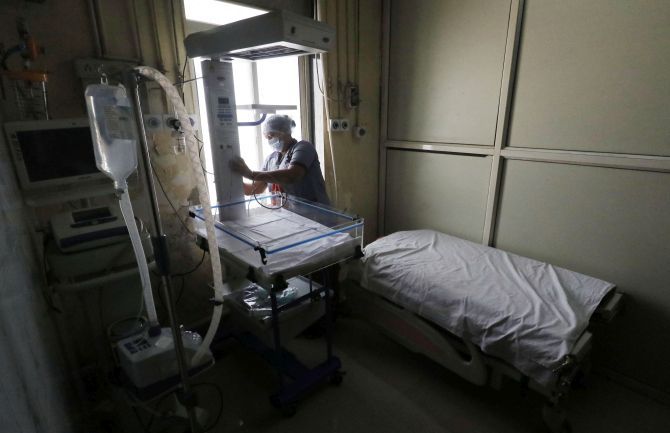Cities are setting the rules that now carry life and death implications for their residents, and most of these rules are sought to be set by the municipal authorities who have never wielded such power, reports Subhomoy Bhattacharjee.

Tukaram Mundhe, the municipal commissioner of Nagpur in Maharashtra, sits in a war room every day with his medical officials to track measures to block the spread of the contagion in the city. Nagpur has opted for institutional quarantine for anyone who tests positive. That means greater monitoring.
"We did it in March itself when we found it impossible to keep people indoors. Placing them in our care has broken the chain of transmission, though the Indian Council of Medical Research guidelines only asked for home quarantine," says Mundhe. The city has managed to keep case fatalities below the national average.
The same camaraderie is, however, missing in Hyderabad.
The Greater Hyderabad Municipal Corporation has threatened to disengage from Covid-19 management in the city. It has said the state health department has not kept it in the loop about the number of cases on a daily basis, leaving the corporation clueless about who to monitor.
Cities are setting the rules that now carry life and death implications for their residents, during this pandemic. Whether it is Nagpur, Hyderabad or Delhi, most of those rules are sought to be set by the municipal authorities, who have never wielded such powers before.
Indian Administrative Service (IAS) officers, for instance, make it a point to stay away from being posted in the city administrations, except as municipal commissioners. This in contrast to rural areas, where the equivalent district magistrate (DM) is an IAS, but his deputies -- sub-divisional officers -- are also from the service.
"Not surprising," says O P Agarwal, chief executive officer-India of World Resources Institute, adding, "Unlike municipalities, DMs are part of the state governments and have, therefore, much wider powers."
Covid-19 has substantially changed this pecking order. One of those was in view in May. Cabinet Secretary Rajiv Gauba met 13 municipal commissioners and DMs of the worst-affected cities. It was unprecedented.
In the rank-conscious Indian bureaucracy, these commissioners occupy slots several rungs below Gauba. In the normal course, they are supposed to report only to their respective state leadership where the Centre has no role.
But it is not a usual time by any means. While the meeting was also attended by chief secretaries of each state government, they were there to answer for the gaps in demands made by the commissioners.
India is still a long way from its cities getting their rightful share of power as the third tier of government. Temporarily though, among many other things that Covid-19 has brought on, is an enhanced role for the city bosses.
Will the current episode make these enhanced roles persist within the municipal administrations? "Covid-19 will certainly make these bodies rethink their role in managing cities," says Pushpa Pathak, senior visiting Fellow at the Centre for Policy Research (CPR).
Pathak, who has also worked with the World Bank and the National Institute of Urban Affairs, is however, doubtful if this will lead to meaningful reforms. "There is a kind of rigidity in the urban sector. The state governments are not willing to give more authority and autonomy to (them)...functional devolution has not been accompanied with comparable financial devolution," says Pathak.
To get some of those reforms to stick, some of the municipal bosses met the chairman of another equally powerful institution, the 15th Finance Commission, N K Singh, in June. Going by the releases issued by the commission, many have forcefully put their points of being shortchanged by the states.
No state has set up state-level finance commissions in time to make more funds available to the third tier. In Uttar Pradesh, of the 18 functions slated to be devolved to the urban bodies, only eight have come to them.
"There was lack of cooperation from the state government officials in releasing information to the (state finance) commission for organisation of data as required, and also there was undue administrative interference from the government officials," notes a release issued by the 15th Finance Commission.
In Rajasthan, "water supply function is partially devolved and urban planning is yet to be devolved... The accountability mechanism and financial reporting of the urban local bodies in the state continue to be weak". As much as Rs 1,652 crore held by these bodies is lying with banks, Singh's team has found out.
The lack of accountability has impacted the fight against the disease as well. About Delhi, Partha Mukhopadhyay, one of India's foremost analysts of the urban sector, says, "On the disease, there has been less effectiveness, largely because the kind of infrastructure needed for doing this is not within the city's control. Currently, contact tracing is done via a medley of workers in the DM's office, once the hospital informs the DM."
Mukhopadhyay, who is senior research fellow at CPR, explains that given the caseload Delhi is generating (it had reported 83,077 cases on June 29), the city administration needed much more investment in information technology (IT) systems than it has now.
The Delhi government's IT department website was last updated two years ago. It is long overdue. One of the plans the Centre had laid out in more peaceful times was the Smart Cities Mission. The plan, written out in 2018, sought to empower local bodies to raise their own revenue, and also laid emphasis on their capacity building.
Mundhe says when he arrived in Nagpur, the city had less than 100 ICU beds to cater to a population of 4.5 million (of the city plus the adjacent rural areas). His first priority was to ramp up this capacity. He had an escape route because of the Epidemic Diseases Act, 1897. He has got around the felt absence of powers by using the provisions of the Act.
"It gives wide ranging powers to the municipal corporations to do whatever is needed in such times," says Mundhe. Finance was drawn from the State Disaster Relief Fund and cajoling the state administration in Mumbai.
But not every city was able to do it. Hyderabad has cited lack of money. Delhi has enough to spare. The state government has an annual budget of Rs 60,000 crore, but lack of accountability between it and the three municipal corporations left gaping holes in the management of the pandemic. It was used by Union Home Minister Amit Shah to walk in with a more hands-on role. Mukhopadhyay says the example could create a narrative that the cities cannot be relied upon.
"The city failed. Who is going to give it more responsibility? This will unfortunately be the narrative, though the city should be much more empowered if we are to have localised responses."
Agarwal also agrees. "The special powers available to them now is unlikely to be willingly shared by the states when the crisis blows over, which is a pity."
Yet, so long as the pandemic persists, it could become the new normal.











